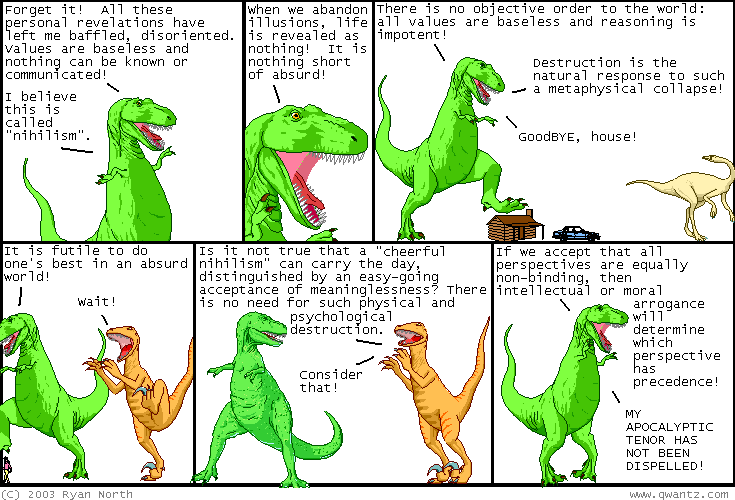Firstly I'm a former-Christian (go ahead, argue I never was one to begin with, make my day) and now a self-confessed Atheist, I've really nothing to gain from this particular discussion except backlash I suppose, though I find logic, the liar paradox and deductive reasoning being dragged into the topic matter somewhat intriguing.
I guess I do kind of feel that if I'm going to die and stop existing permanently, with no thoughts, memories or anything, then my existence, and all of our existences, would be pointless. Just typing that sentence almost gave me a mild panic attack... That thought terrifies me. I suppose part of the reason I cling to my faith is because I want to be assured of an eternal life.
Granted I don't believe in an afterlife (what a ridiculous term indeed "after-death-life") but that's an odd emotionally-based stance you have there: How exactly would you not mind not existing after death? After biological death and the utter cessation of our existence, we wouldn't exist as sentient beings anymore, we stop being self-aware, therefore there is no objection. A rock can't feel sorry that it will never experience being alive, neither can a dead man ever feel terrified his life is over.
Why do we allow people with disabilities to live? There are often a drain on society - shouldn't we have evolved the desire to shun non-beneficial group members? If so, then why are special education teachers typically glorified for their services?
Careful, this is not what Jasi was justifying and you're going way off on a tangent - people with disabilities can still contribute to society. You're basically referring to those with progressive illnesses or severely physically/mentally sick they're a danger to themselves and others around them and need constant care/supervision. There's a world of difference and you can't afford to be this vague on said topic matter.
War is a fact of life, in the human world as well as the animal kingdom. It is evolutionarily helpful in that it better ensures the furthering of your own genes. These things I will admit. But there are still rules against killing. Wars happen because they believe that the other side has done something so atrocious as to make death a fair punishment, thus eliminating the guilt from the parties' minds (mostly). Therefore, it doesn't seem to go against anyone's morals.
But it still stands that most cultures consider killing basically wrong, morally. Of course when anyone can find enough justification for doing something that goes against their own morals, they won't feel guilty about it. There are exceptions to every rule, etc.
This paragraph is laden with unprovable, untestable assumptions, which are by their very nature not objective. You cannot know the thoughts of others, or the psychological motivations of any person's actions, not in their entirety, and thus you will not be able to objectively assess any human action. Biology (and, indeed, science in general) relies on observation, but you cannot observe a person's thoughts. Ergo, there is no way to claim that the study of internal thought processes and morals can be objective.
It's de-facto in society (or civilization whatever term you prefer) that murdering another in cold blood is wrong and an act punishable by law, hence the whole justice system set up as a deterrent to those contemplating taking another's life and implanting a fear of consequence in them.
Saying that most cultures consider killing morally wrong isn't just assumption, its fact. Jasi is generalising yes, but he isn't arguing about observing any particular individual’s entire thought process, he's reflecting upon the average person's standards of behaviour which as far as the majority goes is fairly accurate. If it wasn’t and people could only display total apathy/disregard for each other then we’d all have serious problems going about trying to survive.
I don't believe that free will really exists, not when you really get to thinking about it logically. That doesn't prevent me from enjoying life however. I certainly feel like I can make my own choices.
Then you're lying to yourself - your whole existence is a lie - which is why I can't take any atheists who aren't also nihilists seriously. I'm not attacking you - that's how I honestly feel about this view. It feels like, "Oh, I'm an atheist, except for the parts that make me feel bad," to me.
How ironic you invoked the liar paradox yourself. If someone's unhappy with the theist's loose definition of "free will" then they're not simply going to cease to exist because they've challenged the concept. Why are you angry whenever anyone exposes it to scrutiny?
This has been a stumbling block for you in the past Poore because you refuse to approach this issue rationally and without emotional bias. We had a heated discussion about free-choice not so long ago which ended rather badly.
How the hell do you go about enforcing free will, in a Universe of cause and effect, where not a single one of us actually made a personal decision to come into existence? Neither you nor I ever choose who our parents would be; therefore your interpretation of freedom of choice is already invalid.
I wasn't trying to say that nothing can be true - I was saying that truth is subjective. One of your points seems to be very flippant and suggested that believing in free will was illogical, that that was patently obvious, and (by implication) anyone who thinks that is ignorant, and to that I do not hold. Maybe to you, but not to me. I've had a near-death experience that convinced me very strongly of the existence of the human soul (or mind, or spirit, or whatever you want to call it - something beyond just the flesh and bone). No matter how strange that may seem to you, it is something that I know, so strongly, that it is impossible to express in words. I am aware that this is entirely subjective, and unscientific, and unprovable. I know that my personal experiences can never convince you of anything, because you've never had them. That's fine, but the fact that you've never had that particular experience does not invalidate it for me.
This depends on your perception on events, experiences and values not quite how you subjective reality itself. We HAVE to define objective truth from a subjective perspective, without this contrast we have no definition or grasp of knowledge.
Also you've lost me on this whole "human soul" thing, how did you jump to the conclusion that the brain shutting down as it nears total organ failure is proof of an spiritual or immaterial part we all magically have? And I can't help but feel your recollection of this experience reeks of arrogance, like a person who boasts he, and he alone, had a really good dream but you can't hear about because that would be telling. Sorry if I misjudged you, but that's how you're coming off at this particular moment, with the throwing of all rationality and doubt out the window and whatnot.
...because true science is testable, repeatable, and observable? I understand that our understanding of how the Universe works has changed over time as our technology got better and we were able to more accurately observe phenomena in the world around us. Free will is not a testable hypothesis, therefor you cannot use science to prove or disprove it. Essentially, I'm tired of people claiming that psychology, sociology, and other fields of "science" that deal with the metaphysical and unobservable are true science, and that somehow they can use it to validate their world view that "Free will doesn't exist" or "There is no God." I don't care if you're of the stance that "Since those things can't be evaluated with science, I don't care about them," but using science to validate untestable, unobservable truths is wrong.
Afraid not, if science cannot prove or disprove anything that usually means it does not exist. That's where you should be worried, not relieved.
My Internet penis doesn’t grow if Science has no understanding of the pink unicorn, it shrinks.






















